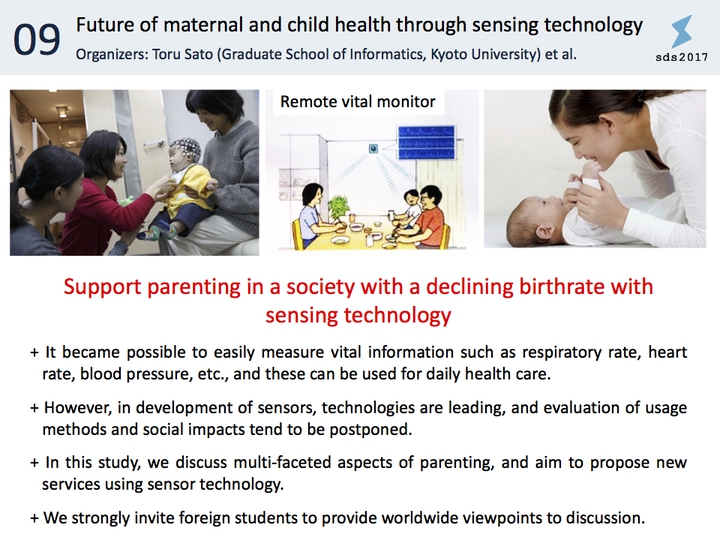Our topic is common to all people. We strongly invite participants with diverse cultural, religious and regional backgrounds, such as foreign residents/students/visitors, as well as Japanese.
| Name | Organization | Specialty |
|---|---|---|
| Toru Sato | Graduate School of Informatics, Kyoto University | Radio engineering |
| Masako Myowa | Graduate School of Education, Kyoto University | Developmental science |
| David Butler | Graduate School of Education, Kyoto University | Developmental science |
The Development of Information and Communications Technology has brought various sensors into our lives. Vital parameters such as respiratory rate, heart beat, and blood pressure, which used to be measured mainly at medical institutions, are now easily available with compact equipment. It is now a social requirement to make use of this information to advance our quality of life through daily health care.
On the other hand, the actual development of sensors at companies and research organizations tend to be technology oriented, meaning that practical applications and assessments of their social impact are often postponed.
In this study, while keeping the state of technology in our mind, we aim at making free discussion from various viewpoints about how child care should proceed in our society with a declining birthrate, and then at proposing new services which make the best use of sensor technology.
As parenting is a familiar and serious problem to everybody, we may be biased by customs and viewpoints of the society surrounding us. Kyoto is an international city with a large number of foreign students and residents. In this study, we therefore aim to discuss this issue by involving people from various cultural viewpoints.
Participants will firstly learn the outline of vital sensing technology from an engineering point of view. Next they will learn about the scientific understanding of acquisition mechanism of the function of the heart in the developmental process of children from the viewpoint of developmental science. Together with short lectures, we will visit the laboratory at the International Science Innovation Building of Kyoto University.
In parallel with this, we will visit nursery schools where multinational children are held, and do field work on issues relating to child care.
Based on these foundations, participants themselves we will conduct surveys, proceed with prototyping of service models based on participants’ own ideas and brainstorming, then finally make proposals on childcare service using sensor technology to open up the future for mothers and children. The discussion will be conducted in English in principle.
Learn the basics of sensing technology and developmental science (Sato and Myowa give lectures) and investigate the state of the latest advanced research. However, participants do not require special background knowledge.
[Design Methods]
Brainstorming, fieldwork (e.g., at the International Science Innovation Building, childcare visits), prototyping, etc.
- Opening and orientation
- Mini-lecture: ”Fundamentals and present status of vital sensing technology”
- Group work in preparation for the field work
- Visit to Kyoto University International Science Inovation Building.
- Field work (visit to international nursery school in Kyoto)
- Brain storming.
- Mini-lecture: ”Scientific understanding of parenting”
- Group work
- Prototyping (development of service model)
- Brain storming
- Preparation (KRP)
- Presentation (KRP)
